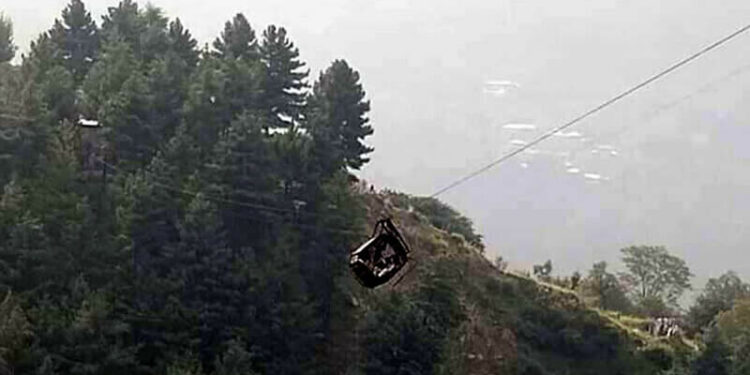In a harrowing incident, two wires of a cable car in Battagram’s Allai tehsil snapped on Tuesday morning, leaving at least eight individuals, including schoolchildren and teachers, stranded at a staggering height of over 2,000 meters above the ground.
These young students had embarked on their journey to school in a mountainous region of Battagram, situated approximately 200 kilometers (125 miles) north of Islamabad. However, their routine commute took a distressing turn when two cables of the motor-driven conveyor suddenly gave way.
The incident unfolded at the GHS Batangi Pashto spot, suspended over the Jangri Khwar stream. Recognizing the gravity of the situation, the Hazara Division Commissioner’s Office swiftly reached out to various authorities, including the National Disaster Management Authority (NDMA), the Provincial Disaster Management Authority (PDMA), and the provincial government’s relief, rehabilitation, and settlement department. They urgently requested a helicopter to initiate a rescue operation.
Responding promptly, the PDMA contacted the NDMA director in Islamabad, leading to the dispatch of a Pakistan Army helicopter to expedite the rescue mission. Shortly thereafter, a second military helicopter joined the operation.
The situation remained precarious as two out of the three cables of the gondola had snapped. Approximately 20 SSG commandos were on board one of the helicopters, assessing the situation. On the ground, rescue teams began the process of setting up nets in preparation for any potential mishaps.
During the initial rescue attempt, it became apparent that the cable car, hanging by a single wire, was exceptionally sensitive to wind pressure. As the helicopter approached, the downwash generated by the aircraft caused the cable car to shake and become unstable. It ended up stranded midway across a ravine, hanging by a lone cable after the other snapped.
Amidst these perilous circumstances, one child fainted due to a combination of heat and fear, according to Shariq Riaz Khattak, a rescue official at the site.
The rescue operation faced further complications due to gusty winds in the area, and there was a risk that the helicopters’ rotor blades could destabilize the cable car further. Military helicopters continued to hover near the stranded cable car, closely monitoring the situation.
Speaking on condition of anonymity, a security official noted that specially trained troops, experienced in sling operations, were involved in this “extremely dangerous and risky operation.” Sling operations refer to aerial operations where large loads are transported in challenging terrains.
Efforts were being made by the Pakistan Army to rescue the stranded individuals safely. Chair lifts are commonly used for transport in the northern mountainous regions of Pakistan, connecting villages.
As concerns grew over the situation, both provincial and federal interim governments issued directives to relevant authorities to expedite the rescue operation and ensure the safety of those stranded.
Interim Prime Minister Anwaarul Haq Kakar expressed his alarm over the incident on social media and directed authorities to ensure the safe rescue and evacuation of the eight individuals. He also urged safety inspections of all private chairlifts to guarantee their safe operation.
Caretaker Interior Minister Sarfaraz Ahmed Bugti similarly emphasized speeding up the rescue operation to save the stranded children and teachers in the Battagram chairlift.
Meanwhile, the NDMA has called for a safety audit of tourist infrastructure by all provincial disaster management authorities in their respective areas. An update from the Pakistan Meteorological Department noted that while the weather in Battagram was clear for the next few hours, conditions may become less favorable by dusk, with rain expected in the area tonight.













